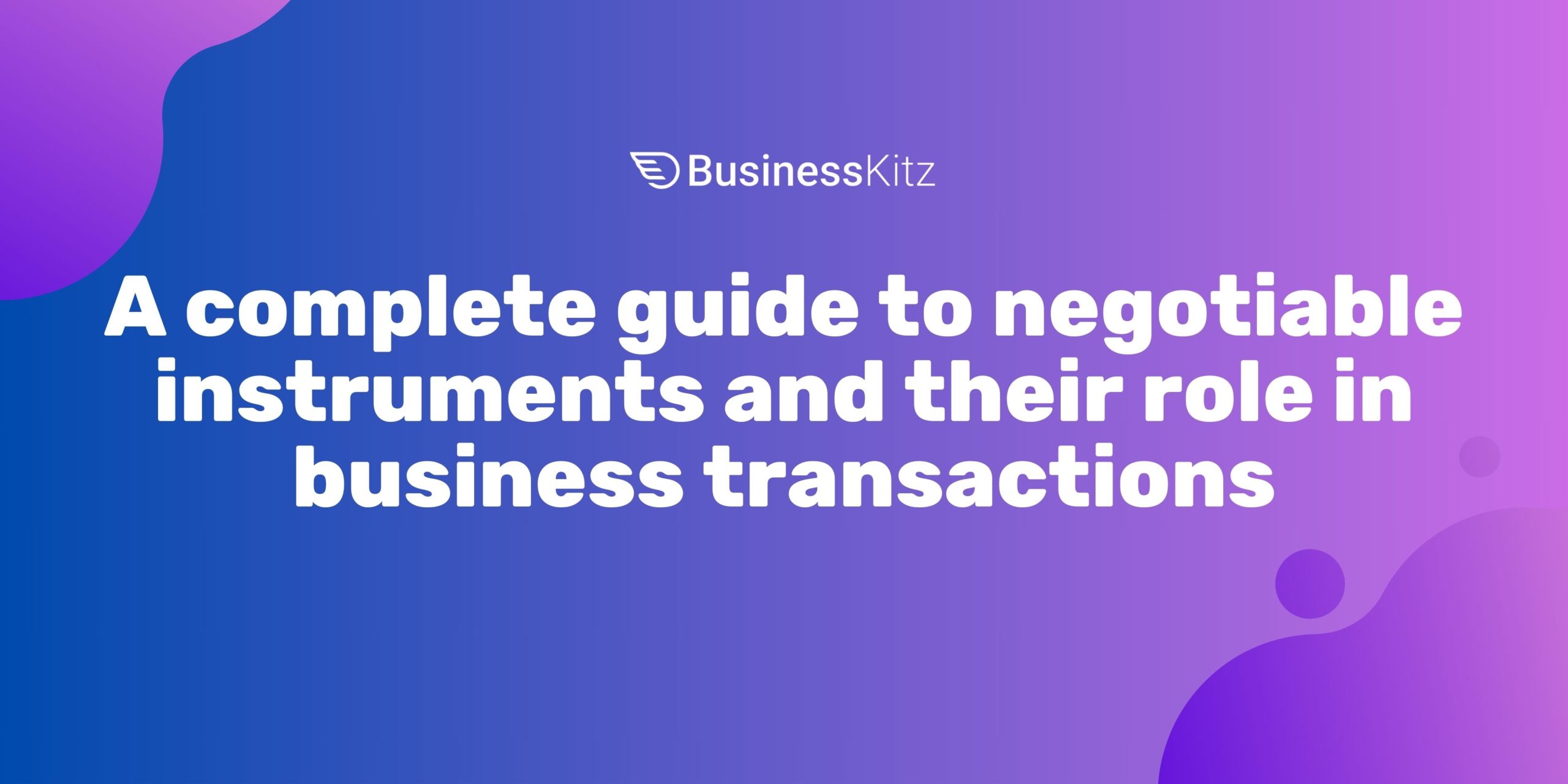
We've helped businesses save $55m with our all-in-one platform. Get instant access to this template and 115+ others, plus AI-powered document creation, starting completely free.
In business, handling payments efficiently and securely is crucial. Negotiable instruments offer a reliable way to manage financial transactions. These legal documents, such as cheques, bills of exchange, and promissory notes, ensure payments are made on time and can be transferred easily between parties. Understanding how they work can help businesses streamline operations and reduce payment risks.
Negotiable instruments are written documents that guarantee payment of a specific sum of money. They include cheques, bills of exchange, and promissory notes. These instruments can be transferred between parties, making them flexible and widely used in business transactions. They provide legal assurance and simplify financial dealings without requiring immediate cash or digital transfers.[ez-toc]
Negotiable instruments are tools that help businesses manage payments without using cash or instant bank transfers. They make it easier to handle money matters in a clear, secure and legally backed way.
A negotiable instrument is a written and signed document that contains an unconditional promise or order to pay a fixed amount of money. The payment can be on demand or at a fixed or determinable future time. These documents are transferable from one person to another, giving the new holder the right to be paid.Examples include:
Each instrument is designed to pay money either to a specified person or the bearer. That means the one holding the document can enforce the payment.
Businesses often face delays between work done and money received. Negotiable instruments help bridge this gap. They give flexibility and liquidity by allowing the transfer of payment rights to others. These tools remove the need for immediate cash or digital payments and help in managing debt or obligations.Key benefits:
Platforms like Business Kitz make it easier to generate, sign, and deliver these documents. Users can store them securely, keep track of each transfer, and make sure each requirement is met. This means better compliance, smooth negotiation, and fewer errors in the finance process. To access a library of over 110 legal template and business documents you can sign up for free here.

A bill of exchange is a key tool in business. It helps businesses handle delayed payments with confidence. This document is often used in trade, supplier deals and service contracts.
A bill of exchange is a written order to pay a specific amount of money. It is issued by one person to another and is payable either on demand or on a future date. This document clearly sets out the obligation to pay and includes the names of all parties involved.It always includes three parties:
This instrument works well for managing commercial risk. It also helps businesses avoid formal loan contracts. A bill of exchange becomes valid when it is signed by the maker, clearly states the amount, and includes the terms and conditions of payment.
Many businesses use bills of exchange to delay payments without harming trust or cash flow. It's ideal in the following settings:ScenarioBenefitExport or import tradeDefers payment until goods are deliveredSupplier agreementsBuilds trust between buyer and sellerHigh-value B2B servicesProtects both parties with clear terms
A promissory note is a written promise to pay a fixed amount of money. It’s a simple yet powerful tool used in business. You can use one to formalise short-term debt, credit deals or funding between partners.
This document involves only two parties:
The maker signs the note and agrees to pay money either on demand or at a fixed or determinable future time. Because the terms are written and clear, the note can help avoid disputes and confusion.A promissory note is often used:
It gives the payee the right to be paid and offers legal protection if the maker doesn’t pay.
To qualify as a negotiable instrument, a promissory note must include these parts:ElementDescriptionAmountA sum certain in moneyDue dateA future date or “payable on demand”InterestOptional but adds clear termsSignatureMust be signed by the makerThis unconditional promise in writing made by the maker creates a binding obligation.
A cheque is a written order to a bank, telling it to pay a specific amount of money from one account to another. Even with digital options, cheques still play a key role in many sectors. They help manage payments where regulation, habit or legal systems support paper-based methods.
Many industries still rely on cheques for business transactions:
In each case, cheques serve as a clear document trail. The cheque is payable only to the specified person or bearer, which helps prevent misuse.
Cheques offer some benefits, but also present risks:ProsConsEasy to track and auditClearing takes timeSuitable for one-off useCan be forged if not secureLegally bindingPoor fit for automated workflows
Negotiability gives legal and financial value to each negotiable instrument. It means the right to payment can move from one person to another. This movement, called transfer, turns documents like a bill of exchange, cheque or promissory note into tools for trade, not just proof of debt.
A negotiable instrument can change hands. The new holder gets the same rights as the last one. If the transfer meets legal rules, the transferee becomes the holder in due course. That person can then enforce the obligation to pay, even if earlier problems existed.
Different instruments need different steps to move legally between parties. These steps must follow clear rules, such as endorsement and delivery.InstrumentTransfer mechanismBill of exchangeEndorsement + acceptancePromissory noteEndorsement (if payable to order)ChequeEndorsement + deliveryTo stay valid, each document must be signed by the maker, state a sum certain in money, and be payable on demand or at a fixed or determinable future time. It must show a promise or undertaking to pay money.
Business Kitz gives users a way to manage the life of each document. It tracks timestamps and stores a copy of each signature. This lowers risk and helps enforce the right to be paid.By keeping a secure history, users can show who had possession, who made the promise, and when they agreed to pay a fixed amount. With this system, your commercial transactions stay clean, clear and safe.

A negotiable instrument is a written promise or order to pay a specified sum of money to a designated party. It can be transferred to others and legally enforced. Common types include cheques, bills of exchange, and promissory notes. They are often used in business to formalise agreements and ensure secure payments.
A statute provides the legal framework for negotiable instruments. It sets out the rules for their use, including how they can be transferred, endorsed, and enforced. The statute helps ensure that these documents meet legal requirements, protecting all parties involved in the transaction.
A bill of exchange is a written order for one party to pay a specific amount to another party. It typically involves three parties: the drawer (who issues the bill), the drawee (who is asked to pay), and the payee (who receives the payment). A bill of exchange drawn on a bank ensures that funds are available when payment is due.
Yes, a promissory note is simpler and involves just two parties—the maker and the payee. It’s often used for short-term loans or internal business agreements. Unlike a bill of exchange, which may involve multiple parties, a promissory note specifies the exact amount and due date, ensuring clear terms.
Negotiation involves transferring the rights to a negotiable instrument. For example, a holder may endorse a cheque or a bill of exchange, making it payable to another party. The transferor signs the document, and the transferee can then present it for payment or use in business. This process allows for flexibility in payments.
Acceptance of a negotiable instrument means agreeing to its terms. For instance, when a drawee accepts a bill of exchange, they agree to pay the specified amount on demand or at a future date. Acceptance confirms the transaction and the obligation to pay. In some cases, a written statement or endorsement is used to accept the instrument.
Both a cheque and a money order are used to pay money to a third person, but they differ in how they are issued and processed. A cheque is drawn on a bank account, while a money order is purchased and issued by a third party like a postal service. Money orders are often used when a more secure payment method is required.
Yes, negotiable instruments are frequently used in international trade. Bills of exchange, for example, are common in cross-border transactions to facilitate deferred payments. These instruments provide a way to manage payments and reduce risk, making them essential for global business operations.

Knowing how to use a negotiable instrument gives your business a strong edge. Whether you use a cheque, bill of exchange or promissory note, each has a clear role in managing payment of money and securing debt.These tools help formalise deals and simplify the movement of funds from one person to another. With the power of negotiability, each document can be passed on, endorsed, and delivered with legal weight. This keeps your deals moving and your cash flow steady.When you manage these instruments digitally, you avoid risk and cut delays. A tool like Business Kitz helps you:
This means fewer disputes, faster access, and better control over every transaction. It also makes it easier to prove your right to be paid or to show a promise to pay a specific amount of money.Every bill of exchange, every cheque is payable, and every unconditional promise in writing made becomes safer and easier to manage.Take control of your business tools today. Use Business Kitz to manage, sign, and protect all your negotiable instruments in one smart system.
Disclaimer: This content is intended to be used for educational and informational purposes only. Business Kitz does not offer legal advice and cannot guarantee the accuracy, reliability, or suitability of its website content for a particular purpose. We encourage you to seek professional advice from a licensed professional and verify statements before relying on them. We are not responsible for any legal actions or decisions made based on the information provided on our website.
Unless expressly stated otherwise, all content, materials, text, images, videos and other media on this website and its contents are the property of their respective copyright owners.
Copyright © 2025 Business Kitz 14312161